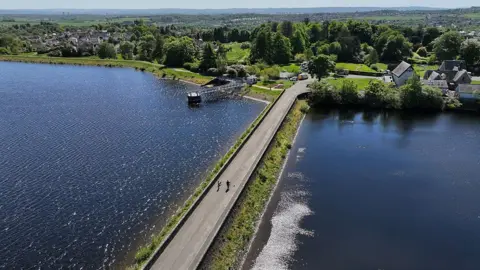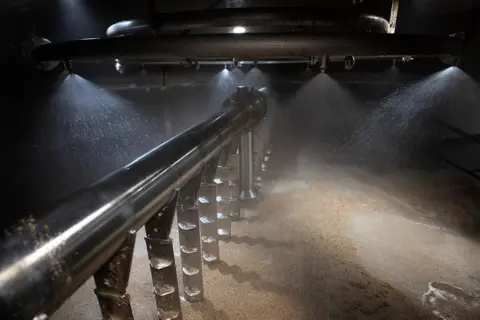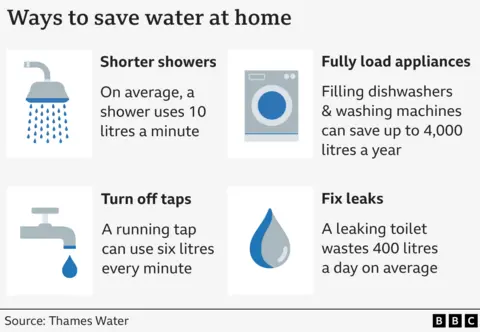Why does Scotland use more water than the rest of the UK?
 Getty Images
Getty ImagesPeople in Scotland have been told to use water supplies sparingly after the driest start to the year since 1964.
But supplier Scottish Water is also warning that the country's relationship with water is unsustainable in the long run.
This is because the average person in Scotland uses about 40% more water than the average person in Yorkshire.
So why does Scotland use more water than the rest of the UK?
Scotland has some of the wettest parts of the UK, so it is perhaps counterintuitive to think about it as a country facing water scarcity.
One challenge is the fact that only around 1% of the country's infamous rainfall is captured in reservoirs.
Another supply issue is that Scotland gets through so much water compared to the rest of the UK.
Figures from regulator Ofwat show that in 2023/24 an average of 140.4 litres of water per person per day was used in England and Wales.
Yorkshire Water's rate in this period was 126.9 litres per day, while Northumbrian Water was 154.7 litres per day.
By contrast, Scottish Water's consumption rate was an average of 178 litres per day.
The way Scots pay for water offers one possible explanation for the bigger consumption rates.
Water meters
 Getty Images
Getty ImagesAbout half of households in England and Wales have a water meter, so they only pay for the amount they use, plus a standing charge.
Only a small number of Scottish households have water meters.
Instead, most pay for water and sewerage services as part of their council tax, with the amount linked to their property's council tax band.
This means that for many in Scotland the only time they see how much they pay for water is when they see the annual council tax statement.
Research has shown that households with meters use less water as they are more aware of how much their usage is costing them.
A mindset of abundance
A fact rolled out on most school trips to Loch Ness is that it contains more fresh water than all the lakes in England and Wales combined.
In a country with 30,000 freshwater lochs, water scarcity is not usually high on the agenda.
But it is this perception of abundance that troubles Scottish Water's chief executive Alex Plant.
Speaking to the BBC podcast ScotCast in February, he said: "We're at a point where we are really worried, collectively as a nation, about the sufficiency of our water supply.
"So we should be thinking about water not as plentiful and abundant and you don't need to worry about it, and more as something that is a precious resource.
"Part of it is this mindset that we assume it's abundant and therefore we don't worry about it too much."
He added: "I think another reason is that almost nobody in Scotland understands how much water they're using because we pay through our council tax (and) we don't understand the amount we're using."
 Getty Images
Getty ImagesScotland is also facing more frequent spells without rain.
Climate change models predict that summers in Scotland will likely become drier, with a potential decrease of 10% to 20% in summer rainfall.
An opinion polling by Consumer Scotland suggests most consumers (77%) in Scotland are concerned about climate change.
However, only around one in five (19%) are concerned about how much water is used in their home.
Creating a better understanding of the link between the impact of climate change and water usage is what Mr Plant wants to address.
The water of life
 Getty Images
Getty ImagesAlthough households are the biggest users of water in Scotland, its industrial uses are also a factor in the overall consumption rates.
Water - both rainfall and surface water - is critical to the production of the country's most famous export, whisky.
This is why distilleries are paying close attention to projections that suggest there will be double the frequency of low river flow events by 2050.
Elsewhere, water from rivers and burns is also vital to Scotland's agricultural sector.
Soft fruit and vegetable production, mainly based in the south and east of the country, often requires large volumes of water to irrigate crops.
This is especially true in dry periods like the current one.
Heavy industry like chemical plants are also big consumers of water, with the Grangemouth industrial complex historically one of the biggest daily users of mains water in the UK.
Are water monitors the future?
Part of Scottish Water's plan to try and get Scotland's consumption rates closer to English rates is to get people thinking about the water they use.
The utility firm is embarking on a pilot project in Dundee to install "smart" monitors for around 2,000 homes over a three-year period.
It is hoped this will help customers understand their water usage and improve Scottish Water's ability to find and fix leaks.
Mr Plant said: "It's a monitor rather than a meter because you're not going to pay for it.
"We'd be able to start showing people what they're using, not to charge by the usage, but just to show people what they are using.
"Understanding what you're using encourages a different relationship with the thing you're using."

